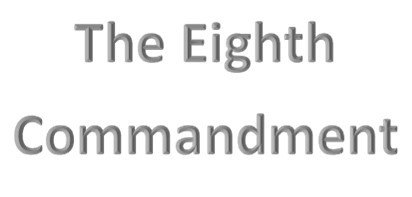The Eighth Commandment

God spoke the 10 Commandments aloud to the thousands of Israelites gathered at the base of Mount Sinai. When He finished speaking, He added “nothing more. Then He wrote them on two stone tablets” and gave them to Moses [Deuteronomy 5:22]. Why nothing more? Because those Ten Commandments are the only laws needed by mankind to develop a perfect society.
The first 4 define our relationship with God; the other 6 define our relationship with each other.
For any Christian asked to define “sin”, breaking any of these Commandments is “sin” [I John 3:4], whether in the simple and obvious meanings or as they were expanded for us by Jesus and His apostles and disciples.
The Ten Commandments are recorded in the Book of Exodus, chapter 20, verses 2 – 17 and Deuteronomy 5:1–22.
Here is the Eighth Commandment:
15 “You shall not steal. Exodus 20:15; Deuteronomy 5:19 (NIV84)
The Hebrew word translated as “steal” is gânab (pronounced gaw-`nab) and its meaning is exactly that of the English word – “to acquire what belongs to another by stealth or deception”.
Later, when I post an essay on the 10th Commandment, we’ll discuss the difference in desiring what belongs to another and the actual taking of something that belongs to another.
Contemplate these expansions of this “simple” Commandment:
- Though the Ten Commandments are for each of us, individually, if we help someone else steal, that also is sin.
- Stealing from a large corporation or organization excusing it by saying “they’ll never know”, or “they’ve got thousands or millions of dollars and won’t miss it” is still stealing
- Cheating on your taxes (not speaking of legitimate deductions or credits) is stealing
- Over-charging someone because they “desperately” need your products or services is stealing
- Finding an object which seems abandoned and taking possession of the object but failing to take steps to establish whether the object is genuinely abandoned and not merely lost or unattended is stealing (in some jurisdictions, this is civil law)
- Not repaying your debts is stealing, even when you steal legally through bankruptcy
- Leaving money, valuables, property or objects that you know are liable or likely to be stolen unprotected and easily visible to a potential thief is helping someone else steal (see the first line in this list).
- Using electronic means to surreptitiously acquire anything of value that is the property of others is stealing (downloading new movies or computer programs from Internet sites that make them available is quite common, or using a neighbor’s WiFi without their knowledge)
- Embezzling from your employer is stealing
- Claiming credit for someone else’s ideas or work is stealing
That this Commandment is ubiquitous and one of the most often broken of the Commandments is proven by the number of “hits” one finds when “Googling” the term “steal” on the Internet — 1,170,000,000 results – that’s ONE BILLION, ONE HUNDRED AND SEVENTY MILLION results! Most of them are incidents of stealing.
Each of us and millions of others should be asking God and our fellow man for forgiveness for breaking the 8th Commandment.

